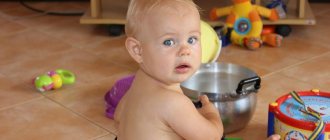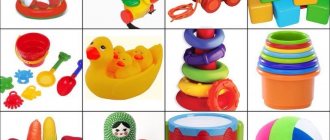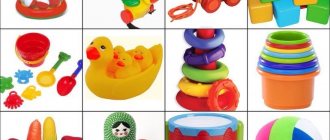Good day to everyone who visited our blog. And I hope this conversation will lift your spirits! What shall we talk about? How to teach a child to play ladushki. Just these words make me smile and my heart fills with sweetness. The little ones do it all so funny, so touchingly, it’s so nice to watch them. At first they are serious, as if “okay” is a task of universal significance that they have to solve. But then you start to like the fun, and delight appears on the little ones’ faces! How great is this!
Reasons for nursery rhyme
But it's not only great! The game of pats is also incredibly useful for the baby:
- If we are talking about a very baby up to a year old, then this simple game helps the baby get to know himself, feel the movement of his hands, and that they can be guided
- Hand motor skills develop, and at the same time brain activity
- An understanding is born about the most important method of communication - tactile
- Rhymes to which people clap their hands develop a sense of rhythm. And hence both musical and analytical abilities
- The whole body is massaged by influencing the treatment points of the hands
- Eliminates negative energy, read more about this further
It turns out that there are good reasons to teach a toddler. But what if a 7-10 month old child doesn’t want to and doesn’t play patsy with you?
What kind of game is this - okay?
A primitively simple nursery rhyme is perceived by the child as an interesting activity, which is accompanied by laughter and a good mood. In fact, teaching a child to play pats and repeat the movements of adults is not so easy.
Putting your palms together and clapping them together is a super task for coordination and rhythm for an inexperienced baby. Children's specialists classify the game of palms as finger games, which are needed in order to develop fine motor skills of the hands. With the help of repeated movements, the baby will begin to feel his fingers, learn to move them consciously and consolidate the result.
The most amazing thing is that our ancestors, inventing fun and seeing how children react to it, intuitively stimulated active points on their fingertips, which increase positive energy, harmonize the psychological state, and get rid of negativity. So this is where this stormy reaction to the game, full of happy emotions, comes from!
Energy of palms
I was looking for a video for you. And I came across an interesting version. In which even the doctor talks about how by rubbing circles on our hands and saying “the white-sided magpie cooked porridge,” we stimulate digestion. And clapping your hands is a massage of the whole body and increases energy, harmonizes the psychological state of the body, and gets rid of negativity. Of course, I have known for a long time that there are many healing points on the hands, but somehow I did not connect them with the ancient nurturing of children. How much we still don't know. Indeed, such simple and at first glance stupid rhymes and lessons have been passed down from generation to generation and have come down to us for a reason. For anyone interested in how they influence, I recommend:
It turns out that okay is not just a game. When you clap your hands, you are performing one of the oldest rituals of communication with the higher world. Hand clapping is an ancient ritual movement that was used in the East to attract the attention of higher beings. In Japan, this movement is called “kashiwade”, and it is accompanied by rituals of worship and ceremonial events. According to Feng Shui, clapping your hands is a cleansing of space from negativity.
You need to clap so that your palms and fingers touch together (this is how children usually clap their hands). It is this gesture that will help harmonize internal and external energy flows, activate them and fill the space with new vitality. After all, our world is a world of energy and these claps help to break up the negative energies around a person.
In everyday life, clapping your hands attracts a lot of positive energy. Therefore, the saying that is said while clapping is very important. They say that if you make a wish at the moment of clapping, it will come true. What else is worth noting is that in the original version, the grandmother drank not mash, but yogurt. To be honest, I was always outraged by the daily mention of drinking brew at my grandmother’s. But it turns out that it was not in vain that he was outraged.
Another positive version of Ladushki, which is accompanied by the saying of wishing goodness and strength to the whole family.
What is the use of “ladushki”?
Educational games for children have come down to us from ancient times. Our ancestors, the Slavs, did not know anything about pedagogical methods of education, they simply nurtured their children, that is, they nursed with love, cherished and cherished. And since the only way to teach a fidget something is through play, they came up with pesters such as “magpie”, “goat”, “ladushki” - nursery rhymes for children, or educational finger games. Research by modern psychologists, educators and neurologists has confirmed the relationship between brain activity and the development of fine motor skills (coordinated actions necessary to perform precise finger movements). It turns out that in order to pick up a rattle on its own, a small organism has to simultaneously coordinate the functions of the muscular, visual and musculoskeletal systems in accordance with the signals received via nerve impulses. And since the motor center of the cerebral cortex, which is responsible for the movement of the fingers, is located in close proximity to the speech area. It turns out that by teaching the baby to perform precise movements with his fingers, we stimulate the development of the visual and speech centers, and also contribute to the progress of mental development. So it turns out that the simple game “okay” is a stimulator of the center of brain development in children. Today, when children are brought up with tablets, androids and computers, the connection between biofields and spiritual mood that connected our ancestors has been lost. In return, we received a generation of selfish people, withdrawn, unable to communicate, and often simply afraid of other children. You shouldn’t trust a player to sing a lullaby, but tell a story to a smartphone. Maybe a professional announcer or singer will perform the work better artistically, but they cannot replace spiritual communication with the mother, the touch of her hands, the sound of her voice, which is so necessary for the child.
How to play pats with your child?
The first thing to do is create an atmosphere. Smile at your Miracle! Emotions are contagious. The baby remembers them in the future, and associates the activities with them.
Second, create the conditions. To prevent the baby from being capricious, nothing should disturb or distract him: he should be well-fed and wear comfortable clothes.
Third, make contact. Stroke the baby's hands, pay attention to them.
Fourth, start reading the poem, placing emphasis where you need to place the lads.
What suitable rhymes do you know? Share! Interesting!
But now you can take the little ones’ hands in yours and clap them. Make it look like it's really cool, interesting and fun!
My friends, the main condition for ANY activity is praise!!! Praise, and your charm will understand that he is doing well. And it’s so nice to be young!
"Goat-dereza"
Lightly tickle the child with a “goat” made from your fingers. You can make “scary” eyes. My son has loved this game since he was 3 months old. Now Alyoshka is already 2 years old, and we play a little differently: I make horns on my head and butt him, and he also shows his horns and butts me back. There are several variations of this nursery rhyme, familiar to everyone from childhood. We like this one:
“I am a dereza goat, I am a thunderstorm for the whole village! I'll gore you with my horns, give me some porridge and pies! I have cool horns, give me some candy! "
Olga D., Alyosha's mother
When to start playing Ladoshi
The question “At what age to start?” is not without meaning. After all, we all want an accelerated development program for our kids. But the thing is that children are all different. And the fact that neighbor Vasya already writes and reads confidently at six months is not a reason to rush his baby. The parents’ task is to help, offer, look for options, get interested in the process, and not insist.
And yet, when should a toddler learn to clap? If at 3 months, when he has already become aware of himself, you began the “preparatory process”, that is, turn on music, read nursery rhymes, clap your hands yourself, then by 7-8 months he understands the meaning. This means that desire will appear.
I’ll tell you a secret, I tried to play ok with my son a couple of times when he was a year old, and then when he was older, but he wasn’t interested. I didn’t really insist, because I don’t like to rush things. And this is not such an important task. There are more serious tasks, for example, potty training. And my son himself came up and asked to play at the age of 4. At this age, he mastered the game in one sitting, he already had a sports interest and passion.
Subscribe to the news, come in, read, share your victories and experiences of defeat. Clap your hands and fill yourself, your baby and your home with positive energy! Don't forget to share the article with your friends. I will be glad to see you again as a guest!
If a child doesn't play okay
If your child enjoys playing other games, such as magpie-crow, bumping, and so on, but refuses to just play ok, then don’t force him. Perhaps the baby just doesn’t like the rhyme, try other variations. If you don't like the game itself, then nothing will work.
If by the age of one year the baby does not understand or recognize educational games at all, then this is a reason to contact a pediatrician, and then a neurologist. But you shouldn’t start worrying right away; perhaps the whole point is simply in the baby’s disposition, and not in his development.
Over the bumps, over the bumps
All children love to jump on adults' laps, on beds, jump off sofas, etc. It never gets boring! Place your baby on your lap and for each stressed syllable, rock the baby up and down to a fun nursery rhyme. You can pick up a very small child and jump with him. If the baby cried, he will instantly calm down and laugh. Works 100%!
Elena K., Matvey's mother
I told poems and nursery rhymes, the children really like them, I bought all sorts of rattle toys to touch them.
Any emotional communication with a child stimulates him to understand the world around him. Here you can download a mega selection of games with babies by month – https://yadi.sk/i/tt_2vA2PqXxZ3
Read also: how to entertain an infant
Tips for teaching children games and nursery rhymes
- Be patient. The baby will not immediately remember the movements. He might not even play at first. Constantly repeat phrases and movements, watch the relationship between gestures and words;
- Children under one year old still have difficulty coordinating movements. Therefore, it is better to carry out the first exercises together, taking the baby’s hands in yours. So, in a short time he will remember the positions and movements of his hands;
- Always play in a good mood, use different intonations in your voice and facial expressions. Children aged 5-6 months can already easily recognize sounds and tone, colors and feelings in the voice;
- Don't yell or get angry at your baby if something doesn't work out! At first, he may make mistakes and get confused. A child’s play should be associated only with pleasant positive emotions;
- Don't start playing with your baby if he doesn't feel well, is sick, hungry, or hasn't gotten enough sleep. Otherwise, he will associate the game with a feeling of fatigue or dissatisfaction;
- If your baby is tired or is no longer interested in playing, do not force him to play or insist on continuing. Switch your attention to another toy or activity;
- Be sure to accompany each poem with gestures, movements, and facial expressions.
Nursery rhymes are used not only for educational games, but also for exercises or gymnastics, studying body parts and fingers.
For newborns and little ones, choose simple rhymes. The nursery rhymes listed above are perfect for babies six months and older. Read more about the development of a baby at 6 months by following the link. Subscribe to our VKontakte group











